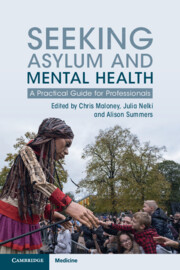Book contents
- Seeking Asylum and Mental Health
- Seeking Asylum and Mental Health
- Copyright page
- Contents
- The Authors
- Foreword
- Acknowledgements
- Glossary
- Introduction
- 1 Why do people seek asylum? The global context
- 2 Seeking asylum in the United Kingdom
- 3 Seeking asylum and mental health
- 4 Access to mental health care
- 5 Assessing mental health needs
- 6 Interpreting assessment findings
- 7 Formulation and diagnosis
- 8 Common diagnoses
- 9 Intervention: the essentials
- 10 Specific interventions
- 11 Children, families, and young people
- 12 Records and reports
- 13 Improving mental health services
- 14 Therapeutic complexity
- 15 Working with people seeking asylum
- Some resources
- Index
- References
1 - Why do people seek asylum? The global context
Published online by Cambridge University Press: 26 August 2022
- Seeking Asylum and Mental Health
- Seeking Asylum and Mental Health
- Copyright page
- Contents
- The Authors
- Foreword
- Acknowledgements
- Glossary
- Introduction
- 1 Why do people seek asylum? The global context
- 2 Seeking asylum in the United Kingdom
- 3 Seeking asylum and mental health
- 4 Access to mental health care
- 5 Assessing mental health needs
- 6 Interpreting assessment findings
- 7 Formulation and diagnosis
- 8 Common diagnoses
- 9 Intervention: the essentials
- 10 Specific interventions
- 11 Children, families, and young people
- 12 Records and reports
- 13 Improving mental health services
- 14 Therapeutic complexity
- 15 Working with people seeking asylum
- Some resources
- Index
- References
Summary
Why do people leave home and seek asylum? Conflict, war, and persecution, living in fragile states, being trafficked, and climate change may all play a part.Global statistics of forced displacement are reviewed.
Types of journeys and attendant experiences are considered, and reasons for how and why people may come to the United Kingdom.
We then review developments in international refugee policy and law, and problems with the current approach, including the role of socioeconomic status, the difficulties in how initiatives are funded, and the lack of long-term perspectives.There are barriers to resettlement in wealthier third countries.Restrictive and punitive asylum policies have a high human cost.There are limits to international cooperation.
This all matters to health professionals because understanding someone’s context explains much about individual behaviour.It enables relevant enquiries to be made, and appropriate help offered. Some possible misapprehensions are considered.
Keywords
- Type
- Chapter
- Information
- Seeking Asylum and Mental HealthA Practical Guide for Professionals, pp. 1 - 28Publisher: Cambridge University PressPrint publication year: 2022
References
Further resources
The Migration Data Portal, developed by the IOM’s Global Migration Data Analysis Centre – https://migrationdataportal.org/ [website]
Global Trends – Forced Displacement in 2019. UNHCR (2020). www.unhcr.org/5ee200e37.pdf [report]
Refuge: Transforming a Broken Refugee System, by Alexander Betts and Paul Collier (2017; Penguin Books) [book]
Hostile Environment, by Maya Goodfellow (2020, Verso) [book]
Violent Borders, by Reece Jones (2016; Verso) [book]
The Migrant Diaries, by Lynne Jones (2021; Fordham University Press) [book]
The Lightless Sky, by Gulwali Passarlay (2015; Atlantic Books) [book]
Home, by Warsan Shire: www.youtube.com/watch?v=nI9D92Xiygo [poem]
What They Took with Them, Jenifer Toksvig (2016); UNHCR – www.youtube.com/watch?v=xS-Q2sgNjl8 [spoken word poem]
Desperate Journeys, Khaled Hosseini (2018); UNHCR – www.youtube.com/watch?v=njvcX0NXRh8 [documentary film]
Human Flow – Ai Weiwei (2017; Altitude Film Distribution) [documentary film]

